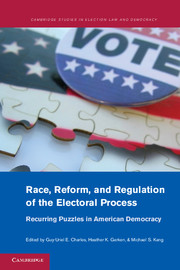Book contents
- Frontmatter
- Contents
- Figures
- Tables
- Contributors
- Preface
- Introduction: The Future of Elections Scholarship
- PART I RACE AND POLITICS
- PART II COURTS AND THE REGULATION OF THE ELECTORAL PROCESS
- Overview: Mapping Election Law's Interior
- 4 The Institutional Turn in Election Law Scholarship
- 5 Judges as Political Regulators
- 6 Empirical Legitimacy and Election Law
- 7 Judging Democracy's Boundaries
- PART III ELECTION PERFORMANCE AND REFORM
- PART IV CONCLUSION
- Index
- References
5 - Judges as Political Regulators
Evidence and Options for Institutional Change
Published online by Cambridge University Press: 01 June 2011
- Frontmatter
- Contents
- Figures
- Tables
- Contributors
- Preface
- Introduction: The Future of Elections Scholarship
- PART I RACE AND POLITICS
- PART II COURTS AND THE REGULATION OF THE ELECTORAL PROCESS
- Overview: Mapping Election Law's Interior
- 4 The Institutional Turn in Election Law Scholarship
- 5 Judges as Political Regulators
- 6 Empirical Legitimacy and Election Law
- 7 Judging Democracy's Boundaries
- PART III ELECTION PERFORMANCE AND REFORM
- PART IV CONCLUSION
- Index
- References
Summary
INTRODUCTION
A major theme of election law scholarship over the last decade has been that judicial oversight of the devices of democracy is desirable to foster adequate political competition. Under this view, politicians' self-interest should preclude them from deciding the conditions for their own future races, such as the location of legislative districts. Apart from the merits or problems with this approach, the reality is that courts increasingly are called upon to engage in political regulation. Election law litigation has more than doubled in the last decade.
Turning to judges as political regulators can be problematic in two ways. First, judges, like politicians, might act in self-interest to favor their past or present political party or to keep themselves in office. Second, apart from self-interest, judges come to these cases with their own world views and might not apply “neutral” principles in deciding election law cases. If either of these two concerns has merit, then the role of judges as political regulators needs further examination. Under what circumstances should judges decide issues of political regulation? What changes in the structure of adjudication or legislative drafting could be made to minimize the problems with judicial regulation of politics? Are there other institutions that may be designed for the regulation of politics?
This chapter does not answer these questions, but sets forth some of the evidence bearing on them as well as an agenda for future research.
- Type
- Chapter
- Information
- Race, Reform, and Regulation of the Electoral ProcessRecurring Puzzles in American Democracy, pp. 101 - 116Publisher: Cambridge University PressPrint publication year: 2011



